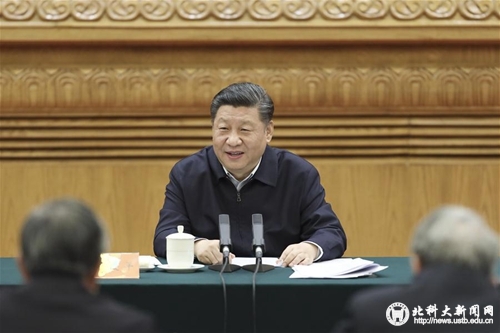

Chinese President Xi Jinping, also general secretary of the Communist Party of China Central Committee and chairman of the Central Military Commission, makes remarks when presiding over a symposium for teachers of ideological and political theory in Beijing on Monday. Photo:Xinhua
Universities across China have positively responded to remarks made by President Xi Jinping at a Monday symposium in Beijing, where he stressed efforts to implement the Party's education policy and the kind of ideological education the country needs and should promote.
Efforts should be made to foster a new generation of young people capable of shouldering the mission of national rejuvenation, and those who have all-round moral, intellectual, physical and aesthetic grounding with a sound work ethic, Xi said.
Xi, also general secretary of the Communist Party of China (CPC) Central Committee and chairman of the Central Military Commission, made the remarks while presiding over a symposium for teachers of ideological and political theory, the Xinhua News Agency reported.
"We should be confident to run the ideological and political theory courses well as they are key to the socialist education with Chinese characteristics," said Xi.
Ideological and political education is vital to nurturing qualified successors to the communist cause of the CPC, Cai Zhiqiang, a professor at the Beijing-based Party School of the CPC Central Committee, told the Global Times on Tuesday.
"It is an important way to pass down political culture and the great achievements the CPC has made to the young generation to help them clearly understand the CPC's path and inherit the CPC's lofty ideals to make contributions to the country as well as the people," he said.
Cai pointed out that Xi had repeatedly used "lifeline" to describe the importance of the course as education can help safeguard and guide the Party's work in other areas by nurturing people to meet the demands of China's development while ensuring the direction of the development.
Xi stressed that there's no ambiguity that the country should nurture the future generation of talent that upholds CPC leadership and the socialist system and be devoted to the cause of socialism.
Xi said it's necessary to set up ideological and political classes at campuses ranging from primary schools to universities amid the Party's efforts to cultivate builders of socialism.
On Tuesday, teachers and students across China, including those from Xiamen University, Hexi University, Shaanxi Normal University and Qiqihar University, studied and discussed Xi's speech and vowed to carry out the spirit of the speech in teaching and studies.
Teaching ideological and political theory courses in school is quite challenging especially as different opinions clash on various platforms, read a commentary from Guangming Daily on Tuesday.
It's a test for teachers on how to instruct their students to look at the country's achievements and shortcomings in a dialectical manner, it said.
The ideological and political courses should deliver the country's mainstream ideology and directly respond to false ideas and thoughts, Xi noted.
Innovative teachers
Xi stressed that the key of the courses lies in teachers, adding that it is crucial to give full play to teachers' enthusiasm, initiative and creativity.
Ideological and political theory teachers must have strong political integrity, deep feelings, creative thinking, a broad vision, be disciplined and upright, Xi said, urging teachers to improve the ideological and theoretical level of the courses and bring the courses closer to students and make them more focused.
Wu Chengzhi, a junior at Hainan Normal University, told the Global Times that his teachers in those courses adopted new teaching methods by assigning homework on microfilm-making instead of boring recitation to encourage students to learn theory through practical experiences.
The University of Science and Technology Beijing set up an online teaching and discussion platform for Marxism to promote a teaching mode through new media and new technologies, Mu Ah'ni, a veteran Marxism teacher at the university, told the Global Times.
For example, during the class, teachers could start a discussion on "using two words to summarize China's modern history" through mobile phones. Each student's reply would be displayed on a big screen. Mu would invite the students to elaborate, which she said could strengthen students' in-depth understanding of class topics.
Eight teacher representatives, including Chen Guo from Fudan University, attended the Monday symposium.
Suggestive guidance works better than indoctrination, and teachers should stimulate students' moral emotions, enlighten their ideals as well as guide them to establish correct views of the world, life and values through interaction and frank discussions, said Chen, also a popular ideological and political theory teacher on Chinese social media.
Colleges across China launched reforms in ideological and political education in December 2016 after Xi stressed the importance and clarified the direction of the education in a conference on ideological and political education at colleges.
After more than two years, ideological and political education runs well in nationwide colleges, which effectively promoted the Xi Jinping Thought on Socialism with Chinese Characteristics for a New Era in textbooks and to students, the Xinhua News Agency reported Sunday.
New teaching styles involving teacher-student interaction and scene teaching respect students' personal character and activate the students' learning initiative, making ideological and political education more interesting, Xinhua said.
A report from China's Ministry of Education showed that among the more than 30,000 college students they surveyed, 91.8 percent like their ideological and political class teachers, Xinhua reported Sunday.
原文链接:《环球时报》(2019年3月20日)
(责编:孟婍)
 最新阅读
最新阅读 2025-11-21
2025-11-21 2025-11-17
2025-11-17 2025-10-31
2025-10-31 2025-10-17
2025-10-17 2025-10-11
2025-10-11 2025-09-29
2025-09-29 2025-09-25
2025-09-25 2025-09-23
2025-09-23 2025-09-18
2025-09-18 2025-09-12
2025-09-12